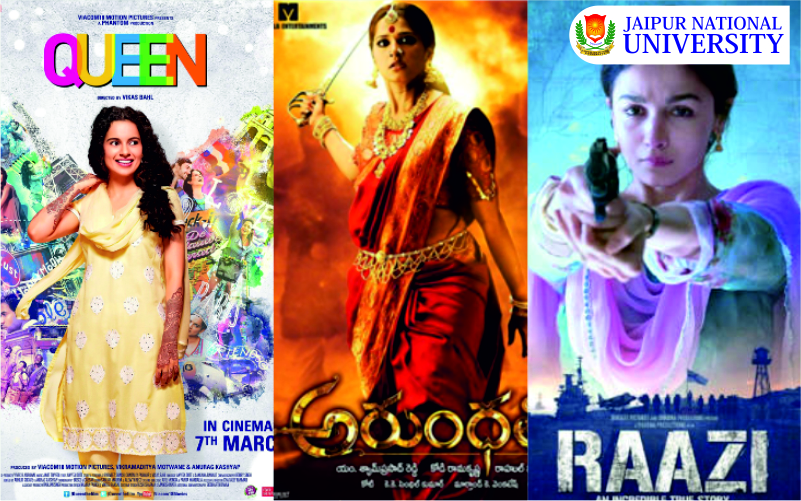The Changing Attitude of Indian Films Towards Women

Since the very beginning, Indian cinema has depicted and portrayed the life of Indian women and highlighted their plights and sufferings on the screen. If we watch the old movies of 50s and 60s, we find women an idol of sufferings either as a mother, sister or daughter. We find in the famous movie 'Mother India', there is no enjoyment except suffering in the life of the heroine. Women are always shown suffering silently and bearing the cruelty of husband, mother-in- law and sister- in- law. They never dare to protest against their sufferings because it was the tradition of our society of that time. However in the 70s to 90s, the women are shown on the screen as a glamorous, showing their body and flirting with the hero. Of course, they are shown as the glamorous, bold and highly educated. It is only the hero of the film who emerges as protector of the women and takes the revenge of heroines’ sufferings by destroying the villain. But with the coming of 2000, the attitude of the film screen writer and director is completely changed. Now, women on the screen are not helpless. They have courage and take revenge of their atrocity and are encouraged to take revenge from their enemies. As we see in Phoolan Devi's movie 'The Bandit Queen' the film depicts how she was suppressed and oppressed by her husband, family, society and raped many times. She took the revenge for the atrocities done against her. There are lots of women centric movies that show the women empowerment in Indian cinema like, Thappad, Mardaani, Pink, Dangal, Chak de India, Neerja, Chappak etc.
Women empowerment has a representative meaning itself and make women more powerful than before. Women were oppressed by hand of patriarchy and thinking also. Women set their lives in the dark corner of the house with women stigma. As the time passes, women were empowered. They know their rights and raise their voice against violence and harassment. When the time was raw, they face everything silently but after the empowerment they hold the stick of rights and authority in their hands and broke stereotypes which became the hindrance in their lives. Many things changed and some of them still exist. After empowering, women’s life style has been changed in every sphere and they become the owner of their lives and free from the hand of patriarchy, who treated them like a puppet. Empowering women give a great contribution in the development of nation and womanhood who plays the main role in every field, like health, education, political, economical, societal and physical norms. They got equal rights as men had whether it was related for paying for their work, opportunities for job and sports etc. Empowering women is the step for women that helps to fade the dark colour of their lives. Indian movies play the important role to explore or portray women empowerment in front of the audience. It is a time of technology everyone chooses to watch movie for the purpose of an entertainment in leisure time whether they are working or non working.
Let us Shades lights on the direction in which the foundation of the film is lead and that was in 1913, when the father of Indian cinema Dada Sahab Falke released movie "Raja Harish Chandra" with an historical theme. At that time, women have no right to work in films, even men played the role of women. Time does not always remain same, some rich women who become the rising star for other women and joined film industry and switch the patriarchal thinking and stereotypes that were prevalent since earlier times.
After the participation of women in film industry the depiction of women were limited in household works. They were suppressed and solicited at the name of characterless and dowry. Man keeps women at the tip of his shoes. They don't have any rights to live her own choice and if she wanted to go outside of the house, she needs to take permission of her husband ; the owner of her life. The reality that existed with the women at home and in society, was the same reality shown in movies in earlier time. The question arises here that this is correct or not for womanhood, who affect more by seeing such a bad things.
In the modern time, modernization in film industry has changed the depiction of women in films. Now, Most of modern movies are women centric. Women play the independent role who have right to live themselves. She can live according to her own choice and take the decision of her life. It brings tremendous changes in womanhood. Now in movies, women were not limited to household works. They break all the stereotype jinx, traditions and, discriminate the patriarchal thinking.
There are lots of movies that portrays the women empowerment beautifully and ethically that is also important for society. As it is shown in movies like "pink" deals with the theme of sexual consent. No means no, the word No needs no explanation. In "Dangal", it shows acceptance of women in sports. As "MOM" shows the power of mother’s love and sacrifice. "Thappad" movie is not just about slap this is the question about respect for women. All these movies are women centric and deals with the theme of women empowerment. These movies paralyzed the patriarchal thinking, traditional stereotypes and proved that if men can do anything that women also can do anything. This is the forward step to discriminate the gender stereotypes and cessation the conventional barrier which demotivates women. Women have their rights on their own life; how to live, this is her choice not man’s choice.
If you like the blog, please share and forward to your friends.